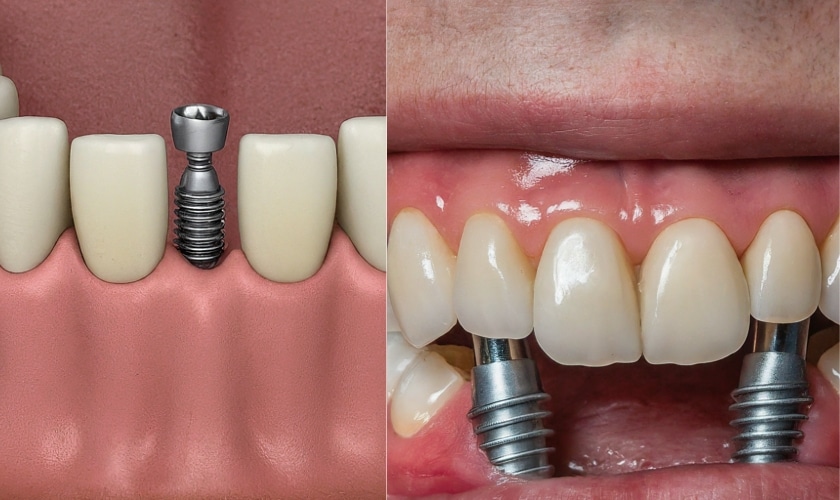An Unbiased View of Dental Sense
An Unbiased View of Dental Sense
Blog Article
Little Known Facts About Dental Sense.
Table of ContentsEverything about Dental SenseSee This Report about Dental SenseDental Sense Can Be Fun For EveryoneThe Best Guide To Dental Sense
are clinical devices surgically dental implanted into the jaw to restore a person's ability to eat or their appearance. They provide assistance for artificial (fake) teeth, such as crowns, bridges, or dentures. When a tooth is lost as a result of injury or illness, an individual can experience issues such as quick bone loss, faulty speech, or adjustments to chewing patterns that lead to discomfort.Oral implant systems include an oral implant body and oral implant joint and might additionally include a joint addiction screw. Professional teeth whitening. The dental implant body is surgically put in the jawbone in place of the tooth's origin. The dental implant abutment is normally affixed to the dental implant body by the abutment fixation screw and extends via gum tissues into the mouth to sustain the affixed artificial teeth
(https://penzu.com/p/6de5c74cda18cc8f)Structure of The Oral Implant System picking dental implants, talk with your dental copyright concerning the potential benefits and risks, and whether you are a candidate for the treatment. Things to consider: Your overall health and wellness is a vital consider determining whether you are an excellent candidate for dental implants, how much time it will certainly take to heal, and the length of time the dental implant might remain in place.
Cigarette smoking might affect the recovery process and reduce the long-term success of the dental implant. The recovery procedure for the implant body may take several months or longer, during which time you commonly have a momentary abutment in place of the tooth. the dental implant treatment: Carefully adhere to the dental health guidelines offered to you by your oral supplier.
Not known Facts About Dental Sense
Implant failing can cause the demand for one more surgery to take care of or replace the implant system. Brings back the capacity to chew Brings back cosmetic appearance Aids keep the jawbone from diminishing because of bone loss Maintains the health and wellness of the bordering bone and periodontals Assists keep surrounding (neighboring) teeth stable Boosts quality of life Damage to surrounding natural teeth during implant placement Injury to the surrounding cells during surgery, such as sinus perforation Injury during surgical procedure (for instance, fracture of bordering jawbone) Insufficient function, such as seeming like the teeth do not attack together usually An experience that the tooth hangs or twisting in position arising from an abutment screw loosening up Implant body failure (looseness of the dental implant body) as a result of systemic infection, which might be more probable in people with unchecked diabetics issues because of neighborhood infection in bone and gums sustaining the dental implant body due to delayed recovery, which might be most likely in individuals that smoke Trouble cleaning the periodontals around the implant, causing bad dental hygiene Untreated gum condition Post-surgical feeling numb due to nerve impingement or damages Constantly inform healthcare service providers and imaging service technicians that you have oral implants before any kind of magnetic resonance imaging (MRI) or x-ray treatments.
FDA is not aware of any kind of unfavorable events reported for MRI or x-ray procedures with dental implants. Oral implants systems are normally made of products that follow global agreement standards of the International Organization for Standardization (ISO) or ASTM International. These requirements have information of what makes a risk-free product.

An oral implant is a structure that replaces a missing tooth. With screw-like devices, the specialist inserts an implant into the jawbone, and it works as a support for a fabricated tooth, called a crown. A tool called a joint connects the artificial tooth to the oral implant. The crown is personalized to fit the person's mouth and match the shade of their teeth.
What Does Dental Sense Do?
Some people are not eligible for dental implant surgery. It is for oral specialists to operate people with: severe illnessuncontrollable metabolic diseasebone or soft cells condition or infectionIf these concerns are dealt with, an individual can have the surgery. In, oral specialists abstain from operating on people with: If people with any one of the above undergo oral implant surgical procedure, there is a greater threat of the dental implant failing.

Oral dental implant surgical procedure is a personalized process. Give you time to heal. Attach the post and final crown, bridge or denture.
Next, your specialist will carefully put the dental implant right into your jaw. Your specialist will rearrange your periodontals and close the laceration with stitches. If your dental implant is near the front of your mouth, your dental practitioner will make a short-term tooth for you to wear till you heal. In this way, you won't have a space in your smile while you recoup.
The Main Principles Of Dental Sense
During the healing phase, your jawbone should fuse to the oral implant. This process can take anywhere from three to 9 months.
As soon as your dental implant heals, your dental practitioner can affix the joint (little port article) and your final restoration more (crown, bridge or denture). This normally takes about one hour to finish and may call for a second small surgery. You should not feel any type of discomfort during your dental implant treatment due to the fact that your provider will certainly use medication to numb your gum tissues.
Report this page